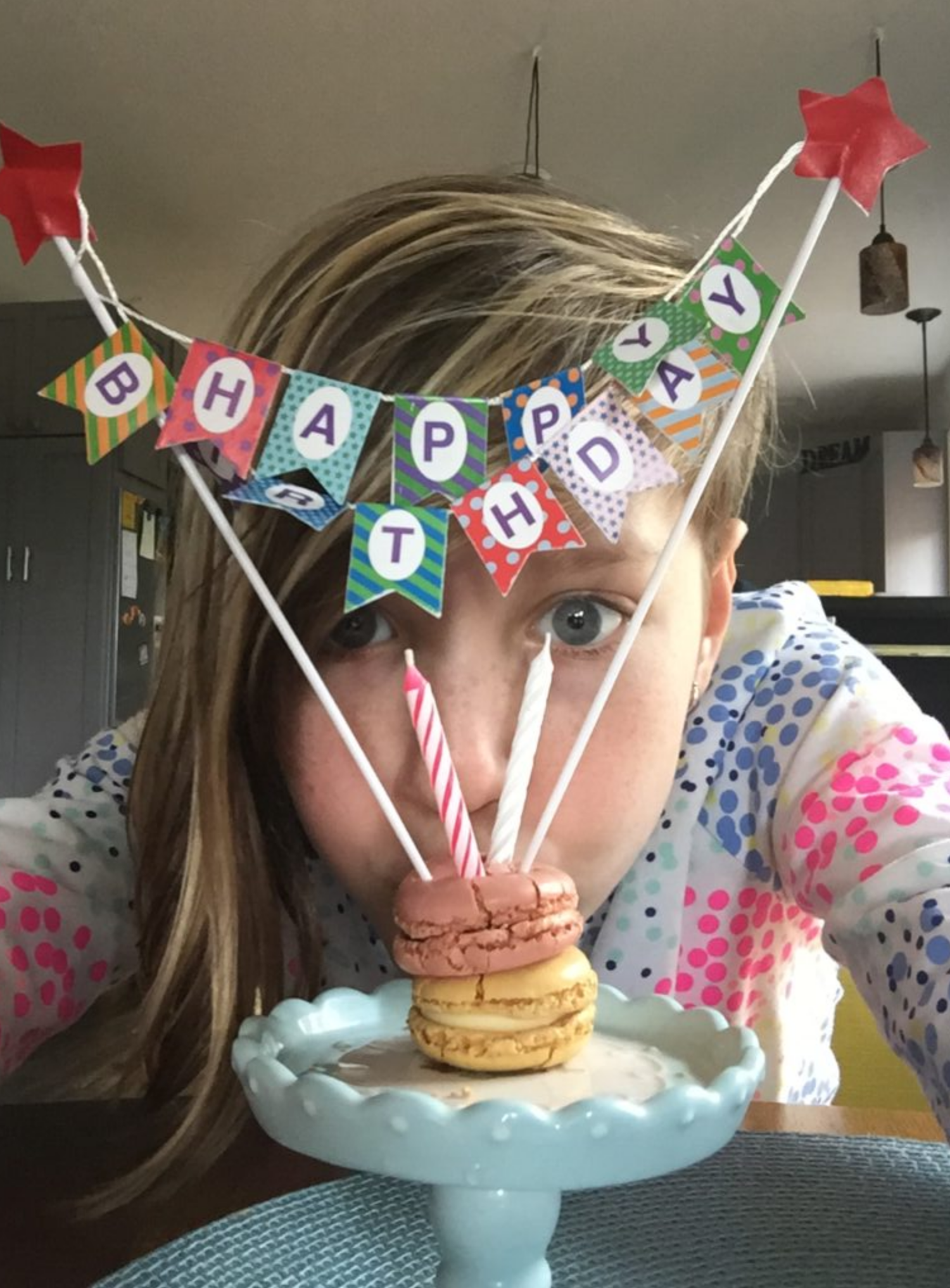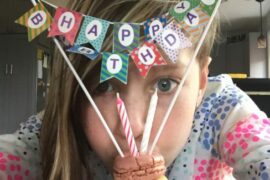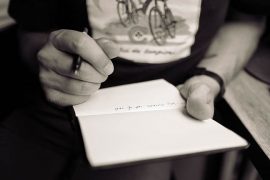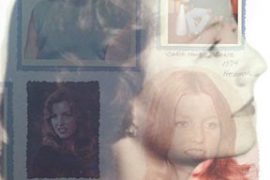I sat in the chair breathing deeply, calmly trying to relax since I opted out of sedatives, thinking novocaine should be enough. After all, it wasn’t much of an area that needed a gum graft, just a small nick at the top of number 8, my right front tooth.
I fell down a waterfall when I was 8, more of a chute actually, but to my 8 year-old self the water fell down an expanse of cement and was therefore a waterfall. or more possibly a waterslide. What can be slid down begs to be climbed up, and slid down again, and again. It was at the end of Wildwood park in Vista where we used to play as kids, circa 1967. On one end of the park this steep cement flume led down into a tunnel under a bridge. We thought of it as a waterslide made extra slippery with moss. After sliding down I attempted to climb back up the face of it instead of scrambling up the rocks on the side. I was more than halfway when I slipped on the moss, falling on my face, teeth scraping cement. Eight years later, at 16, sharp pains randomly shot around my mouth. I couldn’t tell which tooth was the problem until one Sunday morning I looked in the mirror to see a line of swelling run up the right side of my face, flaring the indentation near my nose, puffing out around right inner eye.
My boyfriend, not my parents, found a dentist who would come in on a Sunday morning to work on the abscessed tooth. As the dentist sat me down in the chair he gently explained that he would not be able to inject novocaine in the site due to the swelling (and nitrous oxide was not yet in vogue in the mid 70s). He began drilling up through the back of the tooth seeking to drain the swollen abscess within the rotting root. When he hit the abscess my body flew up and out of the chair, my knotted fist meeting his face. Still, this kind and caring man remained compassionate throughout the rest of the procedure.
The right front tooth slowly turned a dull shade of gray over the next ten years. I finally had the tooth crowned. A dark metal post was put in to replace the rotted root. The tooth next to it, also traumatized by the fall, died a slower, less dramatic death. Eventually both crowns were done at the same time so they might match. As the dentist drilled away the old crown on the right, his he nicked the gum above it. The gum receded as it healed and revealed the dark shadow of the post.
After the dentist finished preparing my two front teeth by grinding them both down to stubs, one a dark metal, the other a yellow core, I picked up the mirror on the tray in front of me for a look. I was horrified to see blood dripping off the stubs. I looked like a defanged vampire.
It was winter, close to Christmas, and so, while I waited for the final crowns to be made I joked with my husband that all I wanted for Christmas was my two front teeth.
After the crowns were placed I brushed down gently above the nick in my gum as I was told, hoping the gum would move down to cover the darkness, but it never did. And yet it was probably not noticeable to most people, except me.
I thought about replacing the crown on the right in an effort to hide the dark margin revealing the post beneath it. However, the memory of my horror during those hours I spent in the dental chair caused me to shy away from the fun of another crown replacement. Instead, why not try grafting a bit of gum over the small nick? I’d had a gum graft once before over the top of an eye tooth that had receded due to over zealous brushing, and it had gone well.
So off I went in search of a periodontist in Central Oregon. I was told there were only two. One had no openings for the rest of the year. It was once again, almost December. But the other doctor was an affable fellow when I went to see him.
He said the insurance probably wouldn’t cover it because, ironically, I had taken such good care of my gums that the tissue was quite healthy and the recession was not enough to justify an insurance-funded graft. Nevertheless, knowing I have good insurance I asked the office staff to try, and Delta D pre-authorized the procedure. A week later, there I was in his chair, but not until, on the day of the procedure, his receptionist told me she had only pre-authorized one insurance company so I would need to pay the balance.
But I’ve never had to do that with my regular office, I told her.
She said I would need to pay, but then I would get refund when they paid.
It was too late to get the authorization I’d requested when they did the first one, so I had no choice. I paid and went in to get prepped for the procedure.
I had been offered sedatives and anesthesia but I’m not keen on drugs. I would have paid for nitrous oxide, but they don’t use because, they said, it gets in their way. Instead, I lay back in the chair, took some deep breaths and began visualizing the relaxed, happy feeling of breathing nitrous oxide. I took deep Yoga breaths and was just starting to feel the slide toward a nirvana-like state, peaceful relaxation. And then he came in, whistling to the music.
Most whistling, but not all, is so high pitched it hits a nerve in my brain that makes me grit my teeth. An audiologist once said I have hearing like a dog. It is not a blessing. I am irritated by too much noise or raucous, competing sounds. The radio was on, tuned to 90s oldies—- I think Macworld by Tears for Fears might’ve been on— anyway it was a song with a heavy beat that bade the listener, at least this doctor, to sing along, tapping his hard soled shoe below my head as he tipped me back to look inside my mouth.
He inserted the cold metal mirror into that soft space where lip meets gum, then yanked up. I tensed as my body lifted up off the chair to meet his pull. He began talking with his assistant, showing her the area and discussing a different procedure than the graft, Tournay’s procedure, because, as he explained, my gum tissue was so healthy and the area to graft was so small that maybe they could just pull from the existing gum tissue down over the tiny nicked area.
How are you doing, he asked, then turned to retrieve another instrument, clearly not expecting an answer.
With the mirror still stuck deeply into my gum and with my lip stretch out I tried to communicate that the tension was really hard. I had to point to make myself understood.
Yes it is, he said, and pulled up a bit more. I grew up on an Arabian horse farm where spirited animals were made compliant with the use of a twitch, a metal chain wrapped around the horses’ nose and lip area during difficult procedures, such as giving shots, worming, or gelding. One twist, then a yank up, and even the most spirited stud turned into a docile quivering animal.
At least he was not whistling now as he pulled my lip out further to show his assistant. When he finally took the instrument out of my mouth, I asked about the procedure.
Oh, it’s just something I’m considering, he said, as if I were little more than a cadaver with no need to know. He began whistling again as he prepared the needle full of novocaine.
I took deep and deeper breaths through the pinching shots. His assistant held up a large rubber seal, a dam that she explained would be placed in my mouth to hold my lips away from my teeth.
My mouth was very dry by now. My lips were beyond chapped, ready to crack. At my regular dentist I am always offered chapstick, with several flavors to choose from—pomegranate, coconut, berry, or iced? Yes please! I don’t even need to raise my hands out from under the warm blanket they’ve covered me with to apply my chapstick of choice, and it is reapplied whenever the kind assistant sees the need.
Not here. No, I cannot have chapstick, not even my own, not even if I put it on myself. When I make a case for it, she says no, it will make the seal slip, and there is plenty of moisture in my mouth.
It is not inside my mouth I’m concerned about, I say.
No, she says, but I will wet your lips. She grabs a napkin, wets it, and dribbles cold water down my neck into my shirt.
Open wide while I put this rubber dam in, she says. She slips it in under my lips, running her finger around the line where my gums meet my teeth to guide the dam into place as she pulls my lips out around it. My mouth now feels three times the size, my lips forming a large O shape, drier than ever as the water she sloshed on me evaporates.
I am left alone while the novocaine does its job. There is no door to this room where voices and laughter fill the hall. In a room next door I hear grinding. The music playing overhead continues its frenetic beat. Why are there no doors? No soft music, no soft voices, no thought for a patient’s comfort? I try to sit up against the angle of the chair, look out the window, find peace in the sight of snow falling outside. I was offered a thin blanket when I first sat down, but I am shivering now. On the other side of the wall a drill is buzzing.
Now the dentist returns, whistling and singing along to the Lion Sleeps Tonight by Tight Fit, sliding his rolling chair up until it crashes into my head rest. He pushes a button, and the motorized chair leans back so far I feel dizzy from the angle. My lips are splayed so wide I feel naked.
The assistant, who I’ll call Marge, asks me to close a little. Ha. But I can say nothing. And I can do even less. I try to regain my composure with a deep breath, but all is shallow.
Are you having a good time, he asks, his foot tapping the floor under my head to the beat of the music.
I cannot speak, except to grunt or moan, which I will not do. Instead, I view it as a rhetorical question. Clearly he is having a heyday.
Just get it over with, I want to urge. I’m fighting feeling annoyed.
He now takes the opportunity to use this as a teaching session for Marge, explaining how Tournay, who was not brilliant or anything, but just made some little change in the way he grafted, pulling down existing tissue and holding his finger against it to help it stay, got his name attached to the procedure. He tells her she might just learn a thing or two today.
Marge, a middle-aged woman with a round face and dull, stringy hair hanging down as she looks over me from above, says something about how she has done several of these procedures already.
Oh no, not in my office, he contradicts her. We’ve maybe done two or three in the years since I’ve been here.
Marge seems confused, but offers that maybe it was before she came to his office, she can’t quite remember.
Maybe she is new to the office, I think. She seems to want to impress him with her knowledge and experience, and he wants to let her know how mistaken she is.
Close down a little, he says to me, and I struggle again to close my wide spread lips, feeling embarrassed, but why?
Are you having a good time, he asks again, so jovial.
What kind of a question is this? I glare at him in an attempt to answer, but my eyes are covered with dark glasses to shield them from his bright light. I take a deep breath in and try to exhale a growing sense of irritation.
He cuts into the gum above my front tooth and asks if I have any pain. I do not, but how am I to answer? I grunt what I hope communicates No.
Good, he says.
He decides he will do a graft after all, so now he must stick a needle into the roof of my mouth. He leaves the room.
This is the worst part, Marge tells me. The roof of your mouth is so tight that it is difficult to get a needle through it, so it pinches quite definitely. But he is so good at it, she says, that it is over quickly.
Marge leaves and returns with a device she holds up for me to see.
This is going to help you keep your mouth open, she says, as if she is offering me a piece of See’s candy. Her wide face and thick neck sit on a full torso swathed in faded purple scrubs tapering to stick figure legs.
Open wider, she says, leaning over me as she shoves the block between my molars, splitting my lips in both corners.
The whistling dentist returns, slides across the floor on his chair, and slams again into my headrest. He tips the chair back farther until I feel almost upside down. He leans over to look inside my mouth and place his instruments, his high-pitched whistle loud in my ear.
Open a little wider, he says, as he stabs the needle into the roof of my mouth.
At least with the block between my teeth they can no longer request that I close my mouth a bit. However, tipped upside down, lips splayed, my jaw locked, I find I can’t swallow against the force of gravity. Saliva pools in the back of my throat. I am a mouth breather, but I can’t breathe either. I make a noise to that effect, and am amazed when they understand me.
Oh, you can, Marge says. Its just the novocaine making you feel that way. You’re fine.
But I am not fine. I am suffocating. And I am beyond agitated. I struggle to sit up, pushing him out of my face.
Stop, Marge yells. You’re going to get a shot of novocaine in your face. But I do not stop until I am upright and breathing again, taking in small wisps of air. My heart is beating faster than the frenetic music.
Open up, she demands, then sticks her finger in my mouth and removes the hard plastic device that she shoved in to keep my mouth open. She looks disgusted, as if she has just retrieved a half eaten nougat from my mouth. My lips are still spread wide with the clear rubber dam.
I can’t breathe, I mumble.
You can breathe, he says. Just breathe through your nose.
I need a suction for the saliva, I say, pointing at my throat because the words are so slurred I wonder they can make them out, my voice a foreign gurgling sound.
Marge says, There is no saliva, but if it will make you feel better, we’ll suction.
The whistling dentist nods and echoes her words, There is no saliva.
If the customer is always right, why not the patient? So far, not one concern has been positively addressed.
I sit there waiting.
They sit there saying nothing.
Finally I gurgle, are you waiting for me?
Yes, they say, when you’re ready. There is no going back now.
I take a deep breath, close my eyes and coach myself to pass through this dark dental tunnel. I have birthed six children, three of them naturally, using breathing techniques and prayer to relax me through the painful process. Only dental work has come close to rivaling that anguish. Now, in this dental arena, I try to draw on the focus and strength that will allow my body to lay back and trust these people to finish what they’ve begun.
They return to their positions, and he tips me back even farther as he begins to cut away at the roof of my mouth. After he gets a chunk of tissue, he presses it in place above my tooth and holds it firmly there, talking to Marge about procedures he’s done. He whistles when he’s not talking, or sings along to the radio.
And then he asks again, Are you having a good time? Because it’s important to both Marge and I that you have a good time. He chuckles.
I fight to get my right hand out from under the blanket, and out around the huge bib draped over me, desperate now to answer this most definitely not rhetorical, but rather, mocking question. I want to say something I never say— F-off—but my voice would be pathetic. I feel for my fingers, which also feel numb at this point, so I count my way around them unsure which fingers to close into a fist. Finally, I figure it out and lift my middle finger toward his face. I have not flipped off anyone in over 40 years, but with lips splayed in a most vulnerable state, this is the only answer I have left for this absurdly taunting man.






Comments are closed.